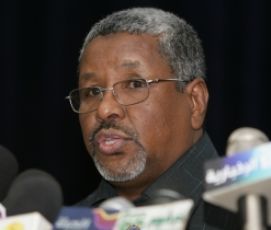Khartoum governor says recent economic measures necessary to fix economy
October 16, 2013 (KHARTOUM) – The governor of Khartoum Abdel-Rahman al-Khidir defended the federal government’s decision to cut fuel subsidies saying that while it harshly impacted citizens it was necessary to redeem the economy.

After almost a year of tip-toeing, the Sudanese government formally endorsed a decision in late September by which prices of gasoline and diesel were increased by almost 100%.
A gallon of gasoline now costs 21 Sudanese pounds ($4.77 based on official exchange rate) compared to 12.5 pounds ($2.84). Diesel went from 8 pounds ($1.81) a gallon to 14 pounds ($3.18).
Furthermore, cooking gas cylinders are now are priced at 25 pounds ($5.68) from 15 pounds ($3.40).
The measures triggered one of the most violent protests that Sudan has seen in many years which activists and right groups say it claimed the lives of hundreds of people.
Sudanese authorities denied using live ammunition and accused elements from the Sudan Revolutionary Front (SRF) of killing protestors to incite people against the government.
Al-Khidir said that people have the right to express their objections to the economic package rolled out but accused unspecified circles of seeking to exploit that to further their own agendas by carrying out sabotage and terrorizing operations to undermine security and stability of the country.
He revealed that the Khartoum government prepared a list of projects aimed at cushioning the impact of the fuel subsidies cut.
Following the independence of South Sudan in July 2011, Khartoum was forced to introduce a contractionary budget that saw the partial lifting of fuel and food subsidies which triggered small demonstrations across the country.
Sudanese officials insist that the country can no longer afford to pay for these subsidies after losing 75% of the oil reserves that are now in South Sudan territory.
(ST)
